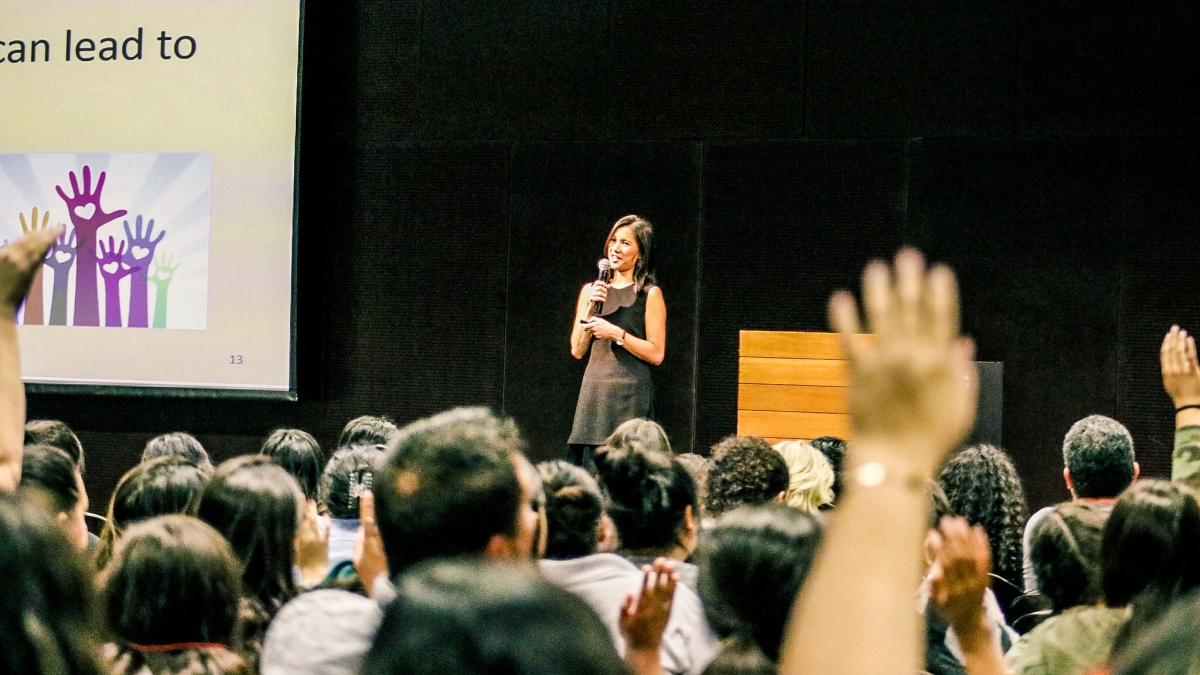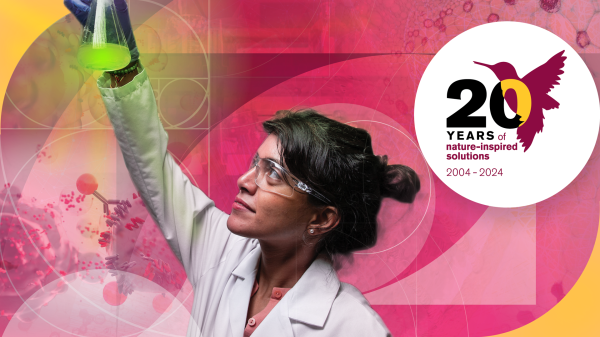Not just a summer fling: Teenage love affects mental health, school performance, ASU research shows

Thao Ha, a new assistant professor in the Department of Psychology at Arizona State University, speaking in front of the ASU Hispanic Mother-Daughter Program. Photo credit: Spencer Brown, EOSS Marketing
Adolescence is a time when biological changes in the body happen faster than psychological changes, a mismatch that creates challenges for teenagers that can lead to problem behaviors, depression or even substance abuse.
Healthy relationships support teenagers as they mature into adults, and many scientists study the relationships teens have with their parents and friends. But though teenagers spend a lot of time thinking about, talking about and being in romantic relationships, few researchers study adolescent romantic relationships. Thao Ha, a new assistant professor in the Department of Psychology at Arizona State University, is one of the few.
“We learn as developmental psychologists that early romantic relationships carry forward into later, more committed relationships such as marriage, but this idea is just starting to be tested,” Ha said. “What if the social and emotional skills necessary for happy and healthy relationships later in life are actually learned in these adolescent relationships?”
Ha studies how experiences in adolescent romantic relationships like conflict and breakups influence mental health, behaviors that promote physical health and engagement in school.
Ha leads the @HEART lab and uses techniques from developmental psychology, social psychology and cognitive neuroscience with the goal of collecting subjective and objective measures about the quality of the romantic relationship. The use of multidisciplinary methods is important, because almost all teenagers who complete surveys about their romantic relationships report being really happy, even though they might not actually be in a healthy relationship. The @HEART lab researchers observe and videotape couples as they work through a conflict, deliver surveys over a long timeframe to couples, measure levels of stress hormones in saliva and measure electrical activity in the brains of couples.
“The most difficult part about this research is keeping up with the teenagers,” Ha said. “Recruiting is challenging because by the time participants are enrolled and scheduled for a study, they might have already broken up!”
In the lab, participating couples might argue or have conversations about jealousy while the researchers videotape the session. The researchers then use the video to identify what emotions each participant displayed, based on their facial expressions, posture and tone of voice, what they talked about, and whether they were supportive to each other.
Ha also sends participants text messages with short survey questions such as: How do you feel today? How jealous are you today? How much love do you feel today? What was the most stressful event today?
“These momentary assessments give us insight into how the relationship functions in real life,” Ha said.
Participants receive the text message survey questions about twice a week for three months. The response rate is high, even after participants are no longer in the romantic relationship. Once teenagers begin a study, Ha said they are very committed participants.
Ha’s research is basic science, but community outreach is also an important part of her work. She recently spoke at the ASU Hispanic Mother-Daughter Program, where she told the mothers, fathers, and teenagers in the audience about the significance of adolescent relationships relative to mental health and school performance and the importance of keeping lines of communication open.
Next year, Ha will collaborate with the Tucson Unified School District to study how teenagers navigate relationships in general, not just romantic relationships, and whether those with healthier relationships perform better in school.
The idea of ASU as the New American University resonates with Ha, who is the oldest child of Vietnamese refugees to the Netherlands and a first-generation college student. When she started college, Ha had no idea what academia was, and a career in science seemed beyond her reach. She credits her mentors at Radboud University Nijmegen in the Netherlands, who supported her and helped her navigate graduate school. Ha earned two master’s degrees in developmental psychology and her doctorate from the university before coming to ASU as a postdoctoral researcher in 2013. Ha first worked in the T. Denny School of Family and Social Dynamics and the Institute for Interdisciplinary Salivary Bioscience Research before joining the Department of Psychology in fall 2017.
More Science and technology

ASU-led Southwest Advanced Prototyping Hub awarded $21.3M for 2nd year of funding for microelectronics projects
The Southwest Advanced Prototyping (SWAP) Hub, led by Arizona State University, has been awarded $21.3 million in Year 2 funding…

Celebrating '20 Years of Discovery' at the Biodesign Institute
Editor’s note: The Biodesign Institute at Arizona State University wraps up its 20th anniversary with the sixth and final…

Student research supports semiconductor sustainability
As microelectronics have become an increasingly essential part of modern society, greenhouse gas emissions, which are associated…